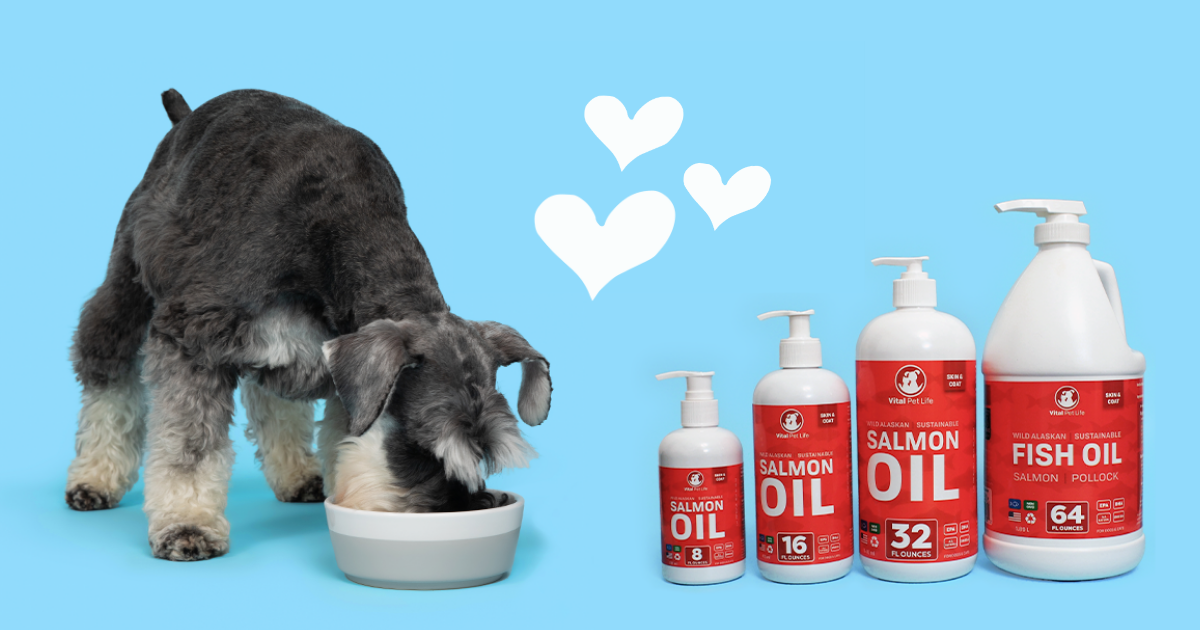
Unlocking the Health Wonders: Fish Oil and Salmon Oil Benefits!
June 30, 2023When it comes to keeping our furry friends healthy, we always want to ensure that we give them the best possible care. This includes their diet and the supplements we give them to ensure they have all the essential nutrients they need to thrive.
One such supplement is fish oil, which has become increasingly popular recently. However, two types of fish oil are commonly available - salmon and regular fish oil. In this blog post, we will compare the benefits of each type and help you decide which one might be best for your dog.
Benefits Of Both Salmon Oil And Fish Oil:

- Both contain high concentrations of omega-3 fatty acids, which are essential for your dog's overall health.

- Omega-3 fatty acids can help reduce inflammation, alleviating symptoms of arthritis, allergies, and other inflammatory conditions.

- It can improve the appearance of your dog's coat and skin, promoting healthy hair growth and reducing itching and flakiness.

- It can support heart health by reducing blood pressure, improving cholesterol levels, and reducing the risk of heart disease.
- Both types of oil can help reduce the risk of certain types of cancer in dogs.
The Unique Benefit Of Salmon Oil:
Salmon oil has a higher concentration of EPA, a type of omega-3 fatty acid that is particularly beneficial for reducing inflammation, making it an excellent choice for dogs with joint pain, arthritis, or allergies.
The Unique Benefit Of Fish Oil:
Fish oil contains DHA, another type of omega-3 fatty acid that is important for promoting healthy brain function and supporting cognitive development in dogs, making it a great choice for puppies and senior dogs.
Advantages of Regular Fish Oil over Salmon Oil
Regular fish oil also has its advantages over salmon oil. One of the major benefits is that it is more affordable. Regular fish oil is generally less expensive than salmon oil, making it a great choice for pet owners on a budget. Additionally, regular fish oil may contain a wider range of omega-3 fatty acids, benefiting overall health and well-being.
Advantages of Salmon Oil over Regular Fish Oil
While regular fish oil is an excellent supplement for dogs, there are a few advantages to choosing salmon oil instead. One of the most significant advantages is the higher concentration of EPA in salmon oil. As mentioned, EPA is known for its anti-inflammatory properties, which can be particularly beneficial for dogs with joint pain or arthritis. Additionally, salmon oil has a milder taste and smell than regular fish oil, making it more appealing to picky eaters.
Looking for the best salmon oil for your furry friend? Try our affordable and high-quality salmon oil for dogs. Packed with omega-3 fatty acids, it promotes healthy joints, skin, and coats and is an excellent choice for dogs with joint pain, arthritis, or allergies. Our salmon oil is sourced from top-quality salmon and ensures your pup gets the best nutrients. Plus, it won't break the bank. Give your dog the best with our must-have salmon oil supplement.
Which One is Right for Your Dog?

Choosing between salmon and regular fish oil can be challenging, but ultimately, it depends on your dog's needs. If your dog has joint pain or arthritis, salmon oil may be the better choice due to its higher concentration of EPA. However, if your dog has no specific health concerns and you are looking for a more affordable option, regular fish oil may be a better choice. Ultimately, you must talk to your veterinarian before starting any new supplements to ensure you choose the right one for your dog's needs.
Conclusion
Both salmon oil and regular fish oil are great supplements for dogs, providing a range of health benefits. While each has advantages, the choice ultimately depends on your dog's needs and budget. Whichever supplement you choose, talk to your veterinarian before starting any new supplements to ensure you give your dog the best possible care.
